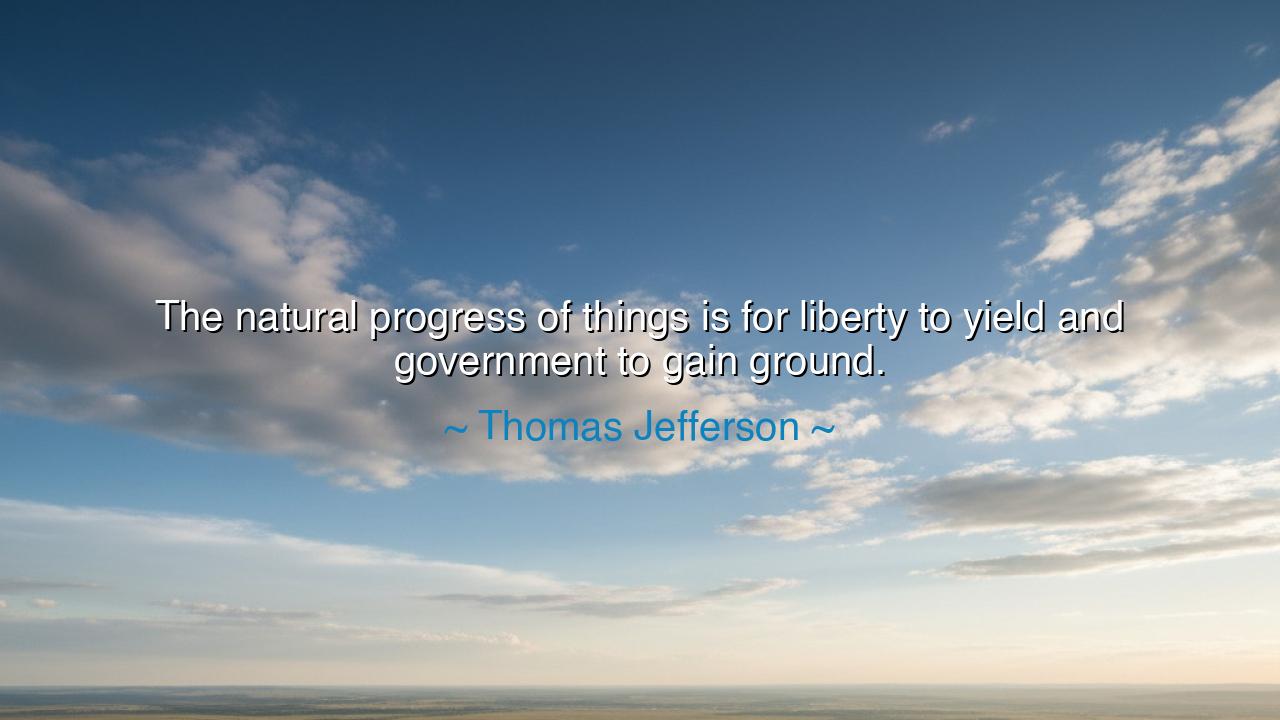
The natural progress of things is for liberty to yield and






“The natural progress of things is for liberty to yield and government to gain ground.” Thus spoke Thomas Jefferson, the sage of Monticello, whose words burn with eternal truth. In this sentence, he lays bare the great law of political decay — that freedom, once won, does not stand still, but slowly retreats before the creeping advance of power. His tone is not one of despair, but of warning. For Jefferson knew, as all wise men have known, that liberty is not a gift secured forever, but a flame that must be guarded, tended, and defended by every generation. His words are not the complaint of a cynic, but the counsel of a prophet who understood that government, like a river, always seeks to overflow its banks unless restrained by the vigilance of the people.
The origin of this quote lies in Jefferson’s deep reflections after the American Revolution, in a letter he wrote to Edward Carrington in 1788. The Revolution had been fought to cast off tyranny, but even as the new Republic was born, Jefferson saw the seeds of danger — not from foreign kings, but from the very institutions created to preserve freedom. He had watched governments throughout history promise protection while quietly tightening their grip upon the governed. In ancient Rome, in medieval Europe, in every land touched by empire, he saw the same pattern: as governments grow, liberty withers. It was not malice that caused this, but human nature itself — the eternal temptation of those in power to expand their authority, and the equal temptation of the people to surrender freedom for comfort, order, or safety.
Jefferson’s insight strikes at the heart of all civilization. He calls it the “natural progress of things,” for it is the way of all human institutions to become more complex, more controlling, more centralized with time. Just as a vine grows until it strangles the tree it clings to, government, left unchecked, entwines itself around every part of life. Its reach begins with good intentions — to provide, to protect, to plan — yet slowly it consumes the very independence that once made the people strong. Liberty, meanwhile, does not die in a single stroke; it fades quietly, inch by inch, as citizens trade self-reliance for ease, and courage for convenience.
History bears painful witness to Jefferson’s warning. Consider the story of Rome, once a proud republic governed by laws, where citizens held their leaders accountable and prized the virtues of freedom. Yet as centuries passed, the Senate grew corrupt, the bureaucracy bloated, and the people complacent. They desired bread and circuses more than civic duty. Power drifted into the hands of emperors, and liberty — once fierce and proud — yielded entirely to government. Rome’s glory remained, but its soul was lost. So too did Jefferson fear that America, if inattentive, might walk the same path: from republic to empire, from self-rule to submission, from freedom to dependency.
Yet Jefferson was not a man to despair. His message was not meant to lament the fall of liberty, but to awaken the guardians of it. He believed that though the tendency of power was to grow, the spirit of liberty could always rise again through the courage of the people. “The tree of liberty,” he once wrote, “must be refreshed from time to time with the blood of patriots and tyrants.” But not all battles need violence; most are fought in quieter forms — in the defense of free speech, in resistance to unnecessary regulation, in the insistence that government remain servant, not master. Jefferson’s teaching calls every generation to reclaim the balance — to push back against the tide of authority and reassert the sovereignty of the individual.
His warning speaks as loudly now as it did in his age. In every corner of the modern world, governments swell with new powers, often in the name of progress or safety. Each new law, each surveillance measure, each bureaucracy begins as a promise to help — and yet each one takes a little more freedom from the people it claims to serve. Jefferson’s words remind us that this is the natural condition of power — not because men are evil, but because power hungers endlessly for itself. The only cure is vigilance, the eternal watchfulness of a free and educated citizenry. For freedom dies not by the sword, but by neglect.
Therefore, O listener, take these words to heart. Guard your liberty as you would guard your life. Question authority; do not worship it. Demand transparency of those who rule, and responsibility of those who are ruled. Teach your children that freedom is not the right to do as one pleases, but the right to govern oneself, to speak without fear, to live without chains. Do not wait for a tyrant to rise — the slow tyranny of comfort and apathy is more dangerous still.
For Jefferson’s wisdom is eternal: liberty yields when vigilance sleeps, and government gains ground when the people forget that they are its masters. Let his warning be a torch to guide you. Stand firm against the slow creep of control. Speak when silence is safer. Act when others hesitate. For only through the courage of the few can the freedom of the many endure — and only through constant renewal can liberty remain what it was meant to be: the breath of the human spirit, unbroken and free.






AAdministratorAdministrator
Welcome, honored guests. Please leave a comment, we will respond soon